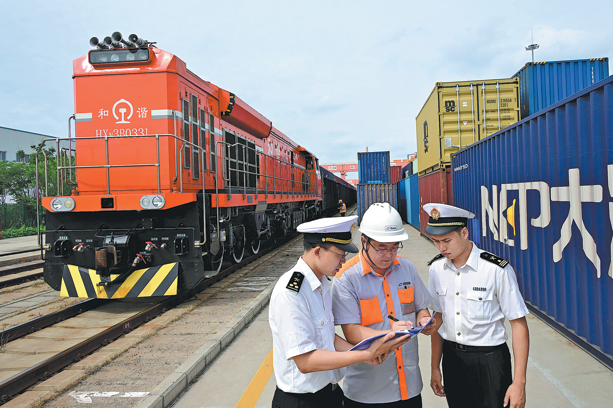EU foreign subsidy rules a setback for Brussels-Beijing ties

China's Ministry of Commerce emphasized on Jan 9 that the European Union's moves under the framework of its Foreign Subsidies Regulation would create trade and investment barriers, with He Yadong, a spokesman for the ministry, urging the EU to change its policy in order to provide a fair, open and non-discriminatory business environment for Chinese enterprises operating in the EU.
The EU says the FSR was implemented in July 2023 to address foreign subsidies, which according to the bloc, disrupts its single market. But Chinese companies have become its primary target. For instance, in February 2024, the European Commission launched an investigation into a subsidiary of a Chinese company, CRRC Corporation Limited, which was bidding for an electric train project, alleging that subsidies distort market competition. This prompted the Chinese company to withdraw from the bidding process. By November 2024, all initial FSR investigations — three in-depth and two self-initiated — were directed at Chinese companies, reflecting the EU's bias.
The Chinese Ministry of Commerce, in response, launched its own investigation into the EU's FSR practices. The investigation revealed the FSR has significant flaws that are harming Chinese businesses. The European Commission's investigations were found to be discriminatory, as all the earlier five cases targeted Chinese companies.
Moreover, the EU's definition of foreign subsidies is ambiguous, often categorizing normal business operations or widely accepted commercial practices as subsidies.
The European Commission's investigations have been marked by excessive demands for information, often in an unreasonably short time. The probes lacked transparency, too, as the EU denied Chinese companies' basic rights such as access to information and the ability to mount a defense. Enforcement methods, including unannounced inspections, were beyond trade laws and disrupted business operations.
Worse, the commission's conclusions on market distortion are arbitrary; they were derived from flawed calculations and ignored counterarguments. Such practices, combined with a reversed burden of proof and severe penalties, have severely impacted Chinese companies.
The commission's investigations have prompted Chinese companies to stop bidding for new projects in the EU, which has cost them about 7.6 billion yuan ($1.04 billion), with the cost of related projects exceeding 8 billion yuan.
With negative publicity eroding clients' trust, some EU member states now exclude Chinese companies from the bidding process.
These measures, however, are not without consequences for the EU. The FSR undermines the broader EU-China economic relationship, which over the past four decades has been mutually beneficial. By discouraging Chinese investment, the EU risks increased public spending, higher commodity prices and job losses. The EU's policies and measures also contradict the bloc's goals of strengthening its manufacturing base and advancing its green transition. Also, concerns over the EU's deteriorating business environment could deter foreign investment, adding to the EU's economic strain.
For decades, EU-China trade has been a cornerstone of global trade. The EU has been China's largest trading partner since 2004, while China remains the EU's second largest. But geopolitical tensions, the COVID-19 pandemic, and the EU's "de-risking" strategy have strained this vital relationship.
As the world faces significant economic challenges and the return of the Donald Trump administration in the US brings uncertainty, the EU will need stable trade partners to navigate the uncertainties. Strengthening its economic ties with China, based on mutual respect and shared goals, aligns with the EU's best interests. Collaborative efforts to uphold multilateralism, promote free trade, intensify climate action and advance digital transformation could create new opportunities for both sides.
The 50th anniversary of EU-China diplomatic relations has created a great opportunity to reset the relationship. By addressing trade frictions, including unfair practices under the FSR, the EU and China can foster a more cooperative and mutually beneficial partnership. A fair EU policy toward China will not only benefit Chinese businesses but also help maintain the EU's long-term economic stability and prosperity.
Peng Bo is a researcher at the Chinese Academy of International Trade and Economic Cooperation; and Wang Dongman is a research associate at the same institution.
Today's Top News
- Shameful betrayal of commitments the real threat: China Daily editorial
- Japan PM's remarks delay China-Japan-ROK meeting
- CPC holds symposium to commemorate 110th birth anniversary of Hu Yaobang
- Economy seen on steady track
- Trade-in program likely to continue next year
- Li: SCO can play bigger role in governance






























